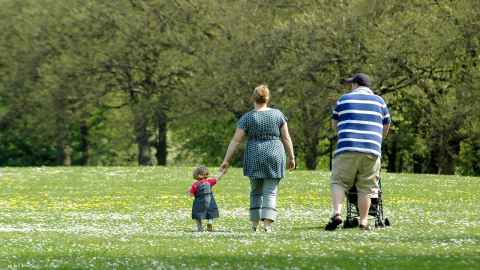Parents want to know if their kids are at risk of obesity
19 December 2019
A new study has shown that most New Zealand parents want to be told if their pre-schooler is at risk of child obesity.

The finding holds across ethnicity, socioeconomic status, and education level.
In New Zealand, one in three children is above a healthy weight by the time they start school. Worldwide, an estimated 40.6 million children aged five years and under are affected by overweight or obesity. High body mass index (BMI) in infancy usually continues into childhood, adolescence and adulthood, and is linked to ongoing physical and psychological health problems.
Obesity prediction models are statistical methods used to calculate the risk of later obesity. They are based on a mix of clinical and demographic factors, such as the mother’s BMI or level of education.
Until recently, little was known about how families would respond to information about their child’s obesity risk. Two small studies in the UK have found that such communication may be acceptable, but these findings may not generalise to New Zealand.
We did not see reduced acceptance among communities more likely to be affected by childhood obesity - those of Māori or Pacific ethnicity, less affluence, or less education.
In what is believed to be the first study of it’s kind in the world, a research team from the University of Auckland-based Liggins Institute conducted an anonymous online survey into this question, engaging with almost 2,000 New Zealand parents, grandparents, and other caregivers of children aged five years and under. Respondents were of various ethnicities and levels of education, and over 30 percent were of Māori or Pacific ethnicity.
The findings were published in scientific journal PLOS ONE. In general, caregivers wanted to know whether their infant was at risk of early obesity, with no major differences in terms of respondents’ ethnicity, socioeconomic status, or levels of education (the exception was Asian respondents who were more accepting of the prediction information than other ethnicities).
Almost two-thirds (62.1 percent) would “definitely” or “probably” want to hear if their child was at risk of early childhood obesity. However, three-quarters (77 percent) said that they would be “worried”, and half (53 percent) “upset” to receive such information. There was a general preference for receiving the news when the child started eating solid foods, rather than earlier. Respondents also wanted more nutritional support to provide a healthier diet to their baby.
The research was carried out under A Better Start National Science Challenge, and the senior author was Liggins Institute professor and A Better Start Director, Wayne Cutfield.

“Early prediction information of their child’s risk of obesity means that caregivers can better manage their health and lifestyle from a young age,” he says. “Long-term weight loss is difficult to achieve in children and adults, so obesity prevention is preferable to treatment from a public health perspective.
"Our findings suggest that if delivered in a sensitive manner to minimise caregiver distress, early childhood obesity risk prediction could be a useful tool to inform interventions to reduce childhood obesity in New Zealand.”
The majority of respondents wanted a medical professional to discuss the prediction information with them, with just over half selecting “family doctor or nurse”, and another 33 percent choosing “Plunket or Tamariki Ora nurse” (professionals who deliver the nationally-funded Well Child programme from birth to age 5 years). “Knowledgeable” was frequently selected as the quality caregivers wanted in their healthcare professional, which indicates that the credibility of the person communicating the obesity prediction is very important.
Lead researcher, Liggins Institute PhD student Éadaoin Butler, says that the findings were fascinating.
“Our study has shown that the prediction of early childhood obesity may be an acceptable means of preventing this condition. However, childhood obesity is a highly stigmatising issue, and any such risk communication would need to be delivered in a sensitive and supportive manner, ” she says.
“Importantly, we did not see reduced acceptance among communities more likely to be affected by childhood obesity - those of Māori or Pacific ethnicity, less affluence, or less education.”
Another finding of interest was that grandparents and males were more accepting of being told of childhood obesity risk. “The increasing numbers of pre-school children now being cared for by grandparents means that they may play an important role in the prevention of early childhood obesity,” Ms Butler says.
Read the article:
PLOS ONE: Acceptability of early childhood obesity prediction models to New Zealand families
Media contact
Nicola Shepheard | Media adviser
DDI: 09 923 1515
Mob: 027 537 1319
Email: n.shepheard@auckland.ac.nz